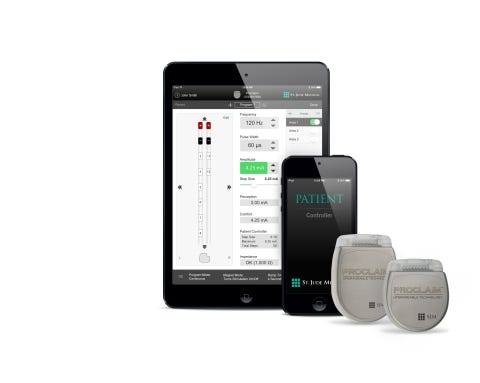The 2 Latest Medical Devices with Mobile Health Credibility
November 20, 2015
St. Jude Medical now has an FDA-approved spinal cord stimulation system that can be programmed with an iPad mini. And Philips has started selling its app-based ultrasound Lumify system--on a subscription basis.
Chris Newmarker
|
St. Jude Medical's new Proclaim Elite spinal cord stimulation system also includes app-based features for patients to evaluate spinal cord stimulation over Apple iPad devices. |
The past week saw important news around two medical devices--an iPad programmable spinal cord stimulator and app-based ultrasound--that represent how traditional medtech companies are increasingly embracing smart tablets and other smart consumer devices.
St. Jude Medical on Thursday announced FDA approval of its new Proclaim Elite spinal cord stimulation system, which it is touting as the the first and only upgradeable, recharge-free spinal cord stimulationsystem available to people in the U.S. suffering from chronic pain. An additional feature of the Proclaim Elite is that doctors and other clinicians can program and adjust therapy using an iPad mini. Patients can also look up information from the device using an iPad looped into the St. Jude Medical Invisible Trial System, which the company describes as a discreet, app-based and wireless neuromodulation programming system .
"The wireless platform is based on the latest Apple technologies making it upgradeable to new therapies for the future," said Allen Burton, MD, medical director of neuromodulation at St. Jude Medical.
On the same day, Royal Philips said its Lumify smart device ultrasound is now available to U.S. health providers through a subscription service--a novel sales strategy in the medical device industry. Lumify subscriptions start at $199 per month, not too much more than what regular U.S. residents pay for monthly cable TV and high speed Internet. The Lumify transducer operates on user-supplied, compatible Android smart devices equipped with Internet and email functionality, and Lumify app dowloaded from Google Play.
"Leveraging a familiar device with portable diagnostic testing makes learning ultrasound easier for new users and more convenient for experienced imagers. I think that convenience and availability will increase the utility of this technology, improving patient care and efficiency," said Bret Nelson, MD, associate professor of emergency medicine at Mount Sinai Hospital in New York.
In other words, doctors and patients alike are widely using smart devices, and are comfortable with them. It makes sense that medical device companies would increasingly pair their products with them, too.
Timothy Deer, MD, president and CEO of The Center for Pain Relief in Charleston, WV, noted that the Proclaim Elite system "can offer appropriate patients an optimal low-maintenance experience while enabling access to future therapies without the need for additional surgeries."
App-based ultrasound opens up a world of possibilities, Randy Hamlin, vice president and business segment leader of Philips Ultra Mobile, told Qmed over the summer.
"It fits on this very smart platform of smart devices," Hamlin said. "It allows us to constantly update content to our users in a very simple way. It's like accepting your app updates that you have on your smart device today. It eliminates the complexity and overhead of our customers have to wait a long time for software upgrades. There are some really amazing things that open up as a tool solution when you go to an app-based iteration."
Qmed recently included both the Proclaim Elite and Lumify in a roundup that asks readers whether devices are hot or hyped.
Learn more about cutting-edge medical devices at BIOMEDevice San Jose, December 2-3. |
Chris Newmarker is senior editor of Qmed and MPMN. Follow him on Twitter at @newmarker.
Like what you're reading? Subscribe to our daily e-newsletter.
About the Author(s)
You May Also Like



